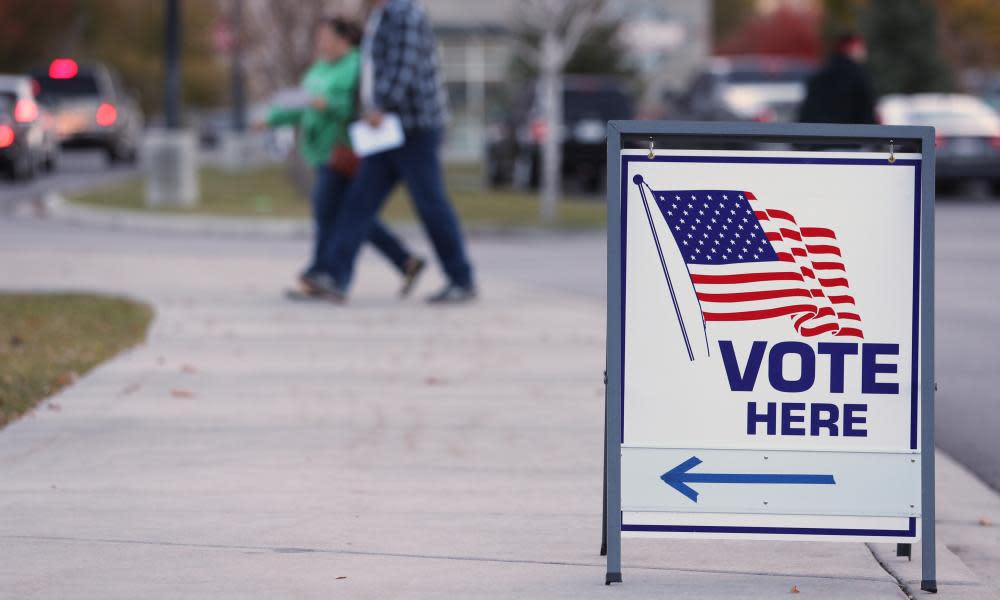American democracy isn't working. We need to rewrite the rules

In a democracy, when people vote for change, things are actually meant to change. But, time and time again, election results in America haven’t reflected the popular will. And the midterm elections were no exception.
Last Tuesday’s turnout was record breaking for a midterm election, and the message from a majority of Americans was clear: Trump and the Republican agenda was repudiated. The Democrats won the national popular vote by around 7%, and they’ll narrowly win back the House of Representatives for their efforts. They won the Senate by more than 12 million votes, but actually lost seats there. Trump and the Republican party will still be in the driver’s seat.
For a historic wave election, that’s a bit of a let-down. And the problem doesn’t just lie with many Democrats running more on moral outrage than a clear agenda for working Americans. It has to do with our system of governance. Under a truly representative system, Trump should have lost his ability to lead a government. He should have been replaced by politicians who had the backing of a legislative majority and were accountable to their mobilized constituents.
But our current system of governance is far from democratic – and I’m not even speaking about the flagrant voter suppression efforts by the Republican party, or the fact that countless districts are heavily gerrymandered to protect incumbents.
These undemocratic practices are bad and should be fought. But even if everyone was allowed to participate meaningfully in the system, we’d still be in trouble. That’s not because our constitutional system is being perverted – it’s a natural result of the system the founders designed.
The US Senate simply exists for no other reason than to stifle democracy
Let’s start with the Senate. It’s a body where around half a million people chilling in Wyoming exert as much power as almost 40 million Californians. Where people living in Puerto Rico and Washington DC get no representation at all. The US Senate simply exists for no other reason than to stifle democracy.
Gerrymandered as it is – and despite its woeful resident to representative ratio – the House of Representatives can at least claim a democratic mandate. The problem is, Trump can, too. (Yes, I know, he won almost 3 million fewer votes than Hillary Clinton. Blame the electoral college, another anti-democratic institution built by the founders.)
This sort of divided government is a common feature in presidential democracies like ours. It’s why these systems tend to be so dysfunctional. Conflicting democratic mandates – along with so-called checks and balances like the president’s veto power – mean it’s difficult to get anything done. Such governments aren’t just ineffectual; they actively erode democracy. The burden of policy making often shifts to unelected judges, or to an ever more powerful executive, trends we’ve seen under Bush, Obama, and Trump.
The dysfunction baked into our divided political system also has anti-democratic knock-on effects. Wealthy Americans and business interests can tolerate a fair amount of legislative malaise, but working-class voters tend to see partisan gridlock in Washington as more proof that politics can’t make their lives better. This in turn leads to greater voter “apathy” – which far from being a pathology seems like a rational response to a broken system.
Luckily, there’s an alternative to the anti-democratic system we’ve been bequeathed, one that’s been adopted by much of the world: parliamentary democracy. In a parliamentary democracy, the executive derives its legitimacy from a legislative mandate. Ideally, a new strong federal government would be run by a proportionally-elected unicameral legislature, free from the anti-democratic Senate. Under such a system, we wouldn’t have to wait until at least 2020 (or an impeachment) for last week’s democratic repudiation of Trump to take effect. A government that reflects the will of a majority of Americans would be coming to power today.
Of course, that’s a far-fetched fantasy at present. The founders left us with a particularly bad system of government that’s nearly impossible to amend. There are small steps we can take right away, such as abolishing the Senate filibuster, which would make Congress more functional, and establishing federal control over elections, which would prevent the sort of voter suppression that Republicans used in the midterms. Ultimately, however, much more will be needed. If we really want to respond to the urgent crisis of climate change and offer the basics of justice and dignity to working class and poor Americans, we need a better way to govern ourselves.
It won’t be easy, but it is possible. Most of the country’s founders imagined a republic of the ruling class – propertied white men – and scraps for everyone else. Over the years, we defeated slavery through civil war, got women’s suffrage in the streets, and won civil rights through a multi-racial mass movement. We created something of a democracy out of a slavocracy. Anything that’s even remotely democratic about our system of governance was won through sacrifice and struggle. And can be done so again.
Bhaskar Sunkara is a columnist for the Guardian US and the founding editor of Jacobin

 Yahoo News
Yahoo News 
